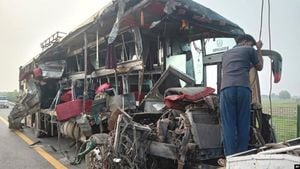After days of intense speculation and backroom negotiations, the Bharatiya Janata Party (BJP) appears poised to finalize its new chief ministerial choice for Maharashtra. All eyes are on December 4, as the historic assembly meeting is set to take place at Vidhan Bhawan, Mumbai, where party MLAs will gather to elect their leader. According to reports, Devendra Fadnavis, who has previously held the chief minister’s office twice, is the frontrunner for the position.
The political scene has become particularly lively as Shiv Sena party leaders and the Nationalist Congress Party (NCP) solidify their teams following their recent successes. Eknath Shinde, the caretaker chief minister and Shiv Sena president, is actively pitching for his return to the throne, emphasizing his leadership during the elections. Shinde remarked at recent gatherings, "I worked as a common man, so the common man feels I should be back in the saddle.” His assertiveness reflects not just his ambitions but also the delicate balancing act among the allies within the ruling Mahayuti coalition.
Explaining the urgency, BJP sources noted the importance of quickly resolving leadership tensions to guarantee stability and effectiveness within the coalition. Following election results where the Mahayuti coalition swept the opposition, much focus now lies on how the portfolios are to be distributed among the partners. Both Fadnavis and Shinde have managed to keep their respective factions on board, negotiating their interests delicately.
The meeting takes place against the backdrop of Shinde’s health issues, which forced him to cancel appointments and take rest, raising concerns about the timeline for the new government formation. "He had to take rest due to health issues," emphasized his son, Shrikant Shinde, hoping to quell rumors of dissent within the ranks.
Speaking of his father’s role, Shrikant adamantly dismissed speculation surrounding his own deputy chief minister potential, labeling the rumors as “baseless.” He stated, "I had the opportunity to take up a ministerial position earlier, but I had declined it, focusing instead on party responsibilities until now. I will continue to work hard for the welfare of my constituency and the Shiv Sena." This assurance seems necessary as speculation swirls about which leaders will claim the top posts.
Prime Minister Narendra Modi's anticipated attendance at the swearing-in ceremony on December 5 signifies the importance of this political maneuvering. The public buildup led to Eknath Shinde securing support from the upper echelons of the BJP, evidenced by deliberations with Union Home Minister Amit Shah concerning portfolios and expected durations of sectarian agreements.
With the BJP appointing central observers, namely Union Finance Minister Nirmala Sitharaman and former Gujarat chief minister Vijay Rupani, the party is ensuring close monitoring of the proceedings. These observers will not only supervise their assembly meeting but are also geared up to convey the selected leader's name back to the party brass in Delhi when all agreements have been finalized.
Despite the excitement surrounding these configurations, charges of electoral discrepancies and conspiracy allegations loom large over the electoral process. Observers from various parties, including the NCP and Shiv Sena (UBT), have voiced concerns about the integrity of Electronic Voting Machines (EVMs) used, contesting their reliability and calling for independent investigations. NCP leader Rohit Pawar stated, "I would challenge the Election Commission; they should allow the public to verify EVMs to dismiss doubts about the integrity of our elections." This statement captured the attention of many as questions of legitimacy could potentially sour the jubilations of the recently attained mandate.
Shiv Sena MLA Varun Sardesai also expressed skepticism about the trends revealed during the polls, casting doubt on the apparent discrepancies between postal ballot results and the EVM counts. He argued for enhanced transparency from the Election Commission, citing statistical discrepancies between expected electoral outcomes and actual results, particularly pointing out unusual voting spikes during the final hours of polling.
Despite these criticisms, the alliance dynamics appear relatively stable for now. Party leaders have insisted they maintain collaborative spirits aimed at effective governance. Shinde himself expressed confidence, proclaiming he does not harbor demands but sees the need for cooperative governance among partners of the Mahayuti.
Overall, the countdown has begun to the declaration of Maharashtra's new chief minister, set for December 4. Party leaders are hopeful this resolution will silence rumors and put doubts about electoral legitimacy on the back burner as they look toward the future governance of the state. With all eyes fixed on these pivotal developments, it remains to be seen how this coalition government will adapt and respond to the challenges it is set to inherit.



